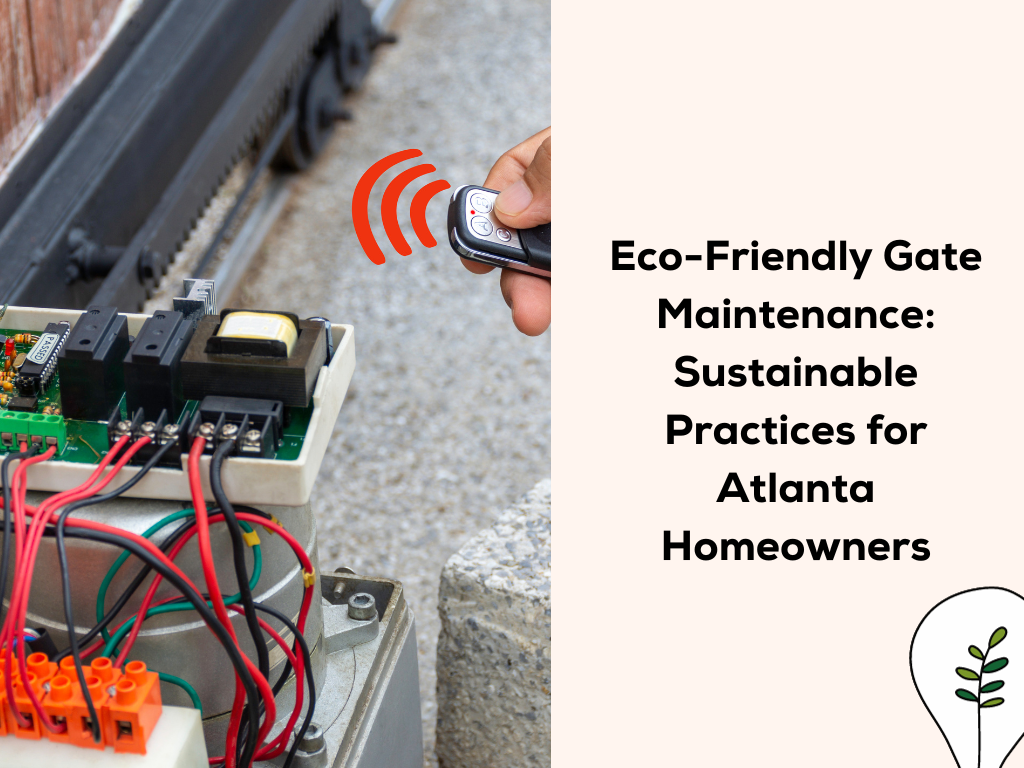Maintaining your property’s gate using eco-friendly practices can benefit both your home and the environment. Atlanta’s hot summers and fluctuating weather can cause gates to deteriorate quickly if they are not properly maintained.

This article will explore sustainable gate maintenance tailored specifically for Atlanta homeowners.
Opting for sustainable maintenance practices helps conserve natural resources and reduces waste. According to the EPA, the U.S. generates over 267 million tons of municipal solid waste annually, much of which comes from short-lived building materials and discarded household items. Adopting a green approach can minimize your environmental impact.
Eco-friendly maintenance also enhances curb appeal. Well-maintained custom ranch gates and thoughtfully designed landscaping can increase a property’s resale value by up to 20%, according to the Real Estate Association NAREL. By using eco-friendly methods, you can maintain an attractive gate while also contributing to the protection of the planet.
Opting for recycled, renewable, and locally sourced materials reduces your carbon footprint.
Many popular paints and finishes release high levels of volatile organic compounds (VOCs) that are problematic for health and the environment.
Exposure to VOCs can cause headaches, nausea, and liver and kidney damage, warns the American Lung Association. VOCs also react with heat and sunlight to produce ground-level ozone, which triggers respiratory issues.
Low VOC paints, stains, and sealants emit fewer harmful fumes, improving indoor and outdoor air quality. Their lower flammability makes them safer to store too.
Read Also :
Handles, hinges, and gate automation systems made from recycled and responsibly sourced materials are easier on the planet while still delivering durable performance. Upcycled and locally crafted accessories offer unique visual appeal.
Smart home technology like solar-powered openers allows keyless and app-based control for convenience plus energy efficiency.
Proactive maintenance preserves your gate’s integrity and prevents costly repairs down the road. Environmentally responsible methods ensure the safety of people, pets, and wildlife while protecting local ecosystems.
Atlanta’s variable climate demands weather-resistant materials and upkeep.
Surrounding gates with native greenery provide an aesthetically pleasing, environmentally harmonious backdrop. Locally adapted plants thrive with less intervention and nurture wildlife.
Over 80 native trees, flowers, and shrubs flourish around Georgia gates. Varieties like oakleaf hydrangea, Virginia sweetspire, and sumac inject multi-season color while attracting bees, birds, and butterflies. Their deep roots help stabilize soil too. Make sure to identify plants and only introduce native species to the area. Double-check surrounding areas for invasive species too to preserve the local ecology.
Smart watering conservation solutions keep plantings lush without waste.
Avoiding toxic chemicals protects kids, pets, and essential pollinators like bees.
Reuse, repurposing, and responsible waste disposal minimize environmental impact.
Before replacing damaged gates, salvage usable spare parts for repairs or creative projects. Resell intact vintage gates to architectural salvage firms.
Repurposed wood and metal components make charming garden markers, support trellises, and jewelry. Upcycled into art and furniture, they divert waste while supporting local artists and craftspeople.
Paints, cleaners, adhesives, and rust removers contain dangerous substances requiring special handling. Check county guidelines for proper disposal methods and household hazardous waste (HHW) collection events.
Adopting green gate maintenance helps Atlanta homeowners conserve resources, nurture nature, and reduce waste regionally. Follow these sustainable practices for keeping your gates visually appealing, functionally sound, and harmonious with our local environment for years to come. Support greener living across Atlanta by sharing these eco-friendly gate tips with neighbors too!
What are signs that my existing gate uses eco-materials?
Which native plants work best around Atlanta gates?
How do I address gate rust sustainably?